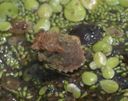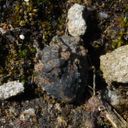Toad Bugs
Gelastocoridae
Classification
- Phylum: Arthropoda
- Subphylum: Hexapoda
- Class: Insecta
- Order: Hemiptera
- Suborder: Heteroptera
- Infraorder: Nepomorpha
- Superfamily: Ochteroidea
- Family: Gelastocoridae
Pronunciation
How to pronounce Gelastocoridae: //d͡ʒɛˌlæstəkəˈrɪdiː//
These audio files are automatically generated. While they are not always 100% accurate, they are a good starting point.
Images






Summary
The Gelastocoridae, commonly known as toad bugs, is a family of about 100 species of insects that exhibit toad-like features and behavior. They are primarily found in riparian habitats and are significant predators in these ecosystems.
Physical Characteristics
Short and stout, typically 6-15 mm in length, with large protuberant eyes and cryptic coloration that can change to match their habitat. They possess hemelytra for their forewings and piercing-sucking mouthparts. Antennae are hidden.
Identification Tips
Look for stout bodies, large eyes, and the ability to blend into environments. Their jumping movements and warty appearance are reminiscent of toads.
Habitat
Primarily found along the margins of streams, ponds, and lakes, although some species (particularly Nerthra) can be found far from water.
Distribution
Worldwide distribution; highest diversity in tropical regions. Gelastocoris is found in the New World, while Nerthra is more common in the Old World.
Diet
Predatory, primarily feeding on small insects that they capture by leaping on them and using modified front legs.
Life Cycle
Adults lay eggs in sand; nymphs frequently cover themselves with sand grains for camouflage.
Ecosystem Role
Important as predators of small insects in riparian ecosystems, contributing to the control of pest populations.
Collecting Methods
- Net sweeping near water bodies
- Hand collecting from vegetation
Preservation Methods
- Ethanol preservation
- Pinned specimens for taxonomic study
Evolution
The family Gelastocoridae shows a record extending back to at least the Aptian period with fossils identified in Burmese amber associated with both extant genera.
Tags
- insects
- toad bugs
- Gelastocoridae
- predators
- riparian